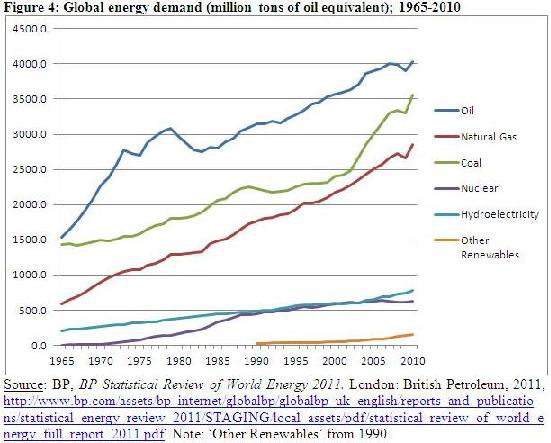The global share from solar, wind, and other green sources has barely budged in 15 years
Despite the proliferation of wind farms and solar panels, green energy is still grasping for purchase.Over the past decade, carbon-free energy production has exploded. In 2012 alone, total global solar-generating capacity ballooned by 43.3 percent, and capacity for wind-generated energy grew by 18.9 percent. The stats and charts seem to imply that carbon-free power is gaining a larger piece of the pie, and will start to whittle away at so-called dirty energy like coal and oil, guiding the world to less carbon output.
But a graph from Roger Pielke Jr., an environmental studies professor at the University of Colorado in Boulder, paints a somewhat different picture. The graph charts the proportion of carbon-free energy consumption to total consumption, and shows that the carbon-free slice hasn't grown for the last 15 years. In fact, the proportion of green-to-dirty energy has shrunk slightly since 1999. So why are proportions of clean-to-dirty energy stagnating as we install more photovoltaic solar panels and erect more wind farms? One recent influence might be nuclear consumption, which more than tripled between 1982 and 2005, then nose-dived last year when Japan, a world leader in nuclear, cut 89 percent of its capacity following the breakdown of the Fukushima Daiichi plant.
Another might be that so-called dirty energy sources like coal, natural gas and oil, which account for a much larger slice of global energy consumption, have all inched up. Coal consumption rose 2.5 percent in 2012, below the 10-year average of 4.4 percent, but enough to offset gains from squeaky clean sources.
This graph from Real Clear Energy, tells a similar story to Pielke's. Renewable energy is growing, but not as fast as carbon-rich energy sources like coal, which exploded in the early 2000s in step with China's industrial growth. So what does the data add up to? According to Pielke:
This stagnation provides further evidence that the policies that have been employed to accelerate rates of decarbonization of the global economy have been largely ineffective. [The Breakthrough]
But a graph from Roger Pielke Jr., an environmental studies professor at the University of Colorado in Boulder, paints a somewhat different picture. The graph charts the proportion of carbon-free energy consumption to total consumption, and shows that the carbon-free slice hasn't grown for the last 15 years. In fact, the proportion of green-to-dirty energy has shrunk slightly since 1999. So why are proportions of clean-to-dirty energy stagnating as we install more photovoltaic solar panels and erect more wind farms? One recent influence might be nuclear consumption, which more than tripled between 1982 and 2005, then nose-dived last year when Japan, a world leader in nuclear, cut 89 percent of its capacity following the breakdown of the Fukushima Daiichi plant.
Another might be that so-called dirty energy sources like coal, natural gas and oil, which account for a much larger slice of global energy consumption, have all inched up. Coal consumption rose 2.5 percent in 2012, below the 10-year average of 4.4 percent, but enough to offset gains from squeaky clean sources.
This graph from Real Clear Energy, tells a similar story to Pielke's. Renewable energy is growing, but not as fast as carbon-rich energy sources like coal, which exploded in the early 2000s in step with China's industrial growth. So what does the data add up to? According to Pielke:
This stagnation provides further evidence that the policies that have been employed to accelerate rates of decarbonization of the global economy have been largely ineffective. [The Breakthrough]



No comments:
Post a Comment